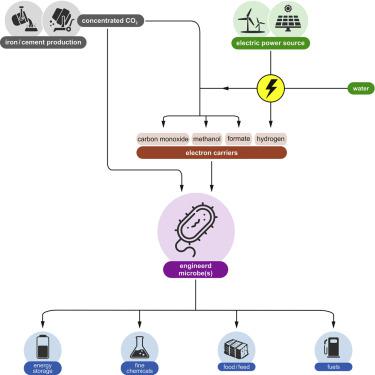Cell Reports Physical Science ( IF 7.9 ) Pub Date : 2020-10-14 , DOI: 10.1016/j.xcrp.2020.100223 Shmuel Gleizer , Yinon M. Bar-On , Roee Ben-Nissan , Ron Milo

|
Humanity is facing two major challenges — the need to feed a growing population with limited land and freshwater resources and global warming, caused by anthropogenic greenhouse gas emissions. The capture of CO2 from the atmosphere and its subsequent utilization lies at the heart of these challenges. Biological systems for CO2 conversion to organic molecules present a promising avenue due to their high product specificity and modularity. The possibility of combining renewable-energy-harvesting systems along with synthetic-CO2-using microorganisms is especially promising. In this article, we discuss recent major advances in engineering microbes to use CO2 and other one-carbon molecules as the feedstock. We portray the gap in cost that integrated abiotic-biotic systems for CO2 conversion should close to become cost competitive by using the techno-economic data of algae as an existing reference solution.
中文翻译:

工程微生物以CO 2生产燃料,商品和食物
人类面临着两个主要挑战:由于人为温室气体排放而导致不断增长的人口需要有限的土地和淡水资源以及全球变暖。这些挑战的核心是从大气中捕获CO 2及其后续利用。由于CO 2的高产品特异性和模块性,用于将CO 2转化为有机分子的生物系统具有广阔的前景。将可再生能源收集系统与使用合成CO 2的微生物相结合的可能性特别有前途。在本文中,我们讨论了使用CO 2的工程微生物的最新重大进展和其他一碳分子作为原料。我们描绘了成本上的差距,即通过将藻类的技术经济数据用作现有的参考解决方案,用于CO 2转化的综合非生物系统将接近于具有成本竞争力。











































 京公网安备 11010802027423号
京公网安备 11010802027423号